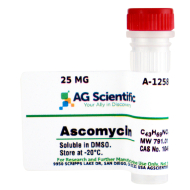An immunosuppressant is any substance that performs immunosuppression of the immunedescribe the image system. They may be either exogenous, as immunosuppressive drugs, or endogenous, as, e. g., testosterone. When the immune system function is suppressed, there is an increased susceptibility to infectious diseases and cancers.
 An immunosuppressant is any substance that performs immunosuppression of the immune system. They may be either exogenous, as immunosuppressive drugs, or endogenous, as, e. g., testosterone. When the immune system function is suppressed, there is an increased susceptibility to infectious diseases and cancers.
Especially, Immunosuppressants drugs are used to weaken the body's immune system. The immune system protects the body from infections and diseases. Immunosuppressive drugs inhibit the activity of the immune system by reducing the proliferation and function of cells associated with immune reactions.
Sometimes the immune system can cause harm to the body, and immunosuppressants are needed to prevent or minimize damage. For instance, immunosuppressants are commonly used to treat autoimmune disorders, such as lupus, rheumatoid arthritis, and multiple sclerosis (MS). Autoimmune disorders occur when the immune system launches an attack against body cells because they are mistaken for harmful invaders, such as bacteria. Left untreated, the immune system can potentially destroy body tissues and organs, which may lead to organ failure. Organ failure is fatal unless the patient receives an organ transplant.
Immunosuppressants are also used to prevent transplant rejection in patients who receive transplanted organs.Transplant rejection occurs when the recipient's immune system does not recognize the donated organ as part of its own body. The white blood cells attack the new organ because it is identified as a harmful foreign invader. Therefore, patients who receive an organ transplant take a combination of immunosuppressants for the rest of their lives to prevent the body from destroying the new organ.
Patients who are taking immunosuppressants should visit their healthcare providers regularly to monitor treatment and check for unwanted side effects. Patients should also take medications exactly as prescribed.
Here are our Immunosuppressant related products : Triptolide, Ascomycin, Mizoribine, Myriocin,Withaferin A, Everolimus, Rocaqlamide
Source: 2011 Natural Standard, Challenges and Solutions to Immunosuppressant Therapy William J. Polvino, MD, President and Chief Executive Officer, Veloxis Pharmaceuticals, Edison, N.J. Wikipedia.
An immunosuppressant is any substance that performs immunosuppression of the immune system. They may be either exogenous, as immunosuppressive drugs, or endogenous, as, e. g., testosterone. When the immune system function is suppressed, there is an increased susceptibility to infectious diseases and cancers.
Especially, Immunosuppressants drugs are used to weaken the body's immune system. The immune system protects the body from infections and diseases. Immunosuppressive drugs inhibit the activity of the immune system by reducing the proliferation and function of cells associated with immune reactions.
Sometimes the immune system can cause harm to the body, and immunosuppressants are needed to prevent or minimize damage. For instance, immunosuppressants are commonly used to treat autoimmune disorders, such as lupus, rheumatoid arthritis, and multiple sclerosis (MS). Autoimmune disorders occur when the immune system launches an attack against body cells because they are mistaken for harmful invaders, such as bacteria. Left untreated, the immune system can potentially destroy body tissues and organs, which may lead to organ failure. Organ failure is fatal unless the patient receives an organ transplant.
Immunosuppressants are also used to prevent transplant rejection in patients who receive transplanted organs.Transplant rejection occurs when the recipient's immune system does not recognize the donated organ as part of its own body. The white blood cells attack the new organ because it is identified as a harmful foreign invader. Therefore, patients who receive an organ transplant take a combination of immunosuppressants for the rest of their lives to prevent the body from destroying the new organ.
Patients who are taking immunosuppressants should visit their healthcare providers regularly to monitor treatment and check for unwanted side effects. Patients should also take medications exactly as prescribed.
Here are our Immunosuppressant related products : Triptolide, Ascomycin, Mizoribine, Myriocin,Withaferin A, Everolimus, Rocaqlamide
Source: 2011 Natural Standard, Challenges and Solutions to Immunosuppressant Therapy William J. Polvino, MD, President and Chief Executive Officer, Veloxis Pharmaceuticals, Edison, N.J. Wikipedia.

